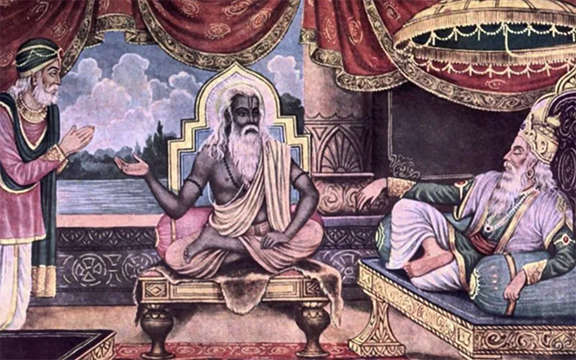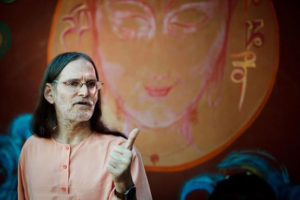
(Photo, L-R: Sanjaya, sage Vyasa and Dhritarāśhtra, the king.)
In Part 3 of this series, we read the first verse of the first chapter, and we were introduced to the blind King Dhritarāśhtra. This week I’d like to introduce us to Sanjaya. Let me share the first verse again:
“Dhritarāśhtra asked, What did the Pāndavās and my sons do when
they assembled on the holy land of Kurukshetra, eager to fight, O Sanjaya?”
Sanjaya is the king’s minister, and the reason the king is asking Sanjaya this question is that Sanjaya was given a boon, this special power by the sage Vyasa of being able to see what’s happening on the battlefield a few miles away. He was also able to know what’s happening in the minds of the people, the combatants there.
Vyasa first offered this boon to the blind king himself. And the blind king thought about it and said, “You know, I haven’t seen my whole life. Do I want to open my eyes and see this carnage, and the battle?” And he declined.
But when Vyasa said, “Well, I could offer it to your minister,” he said, “Okay, that could come in handy if I want to see what’s happening.” So that’s what happened. And Sanjaya, as the king’s minister, is also operating as the king’s conscience. He has to do it in a very delicate, respectful way. He’s trying to help the king to see that it would actually benefit the country if the king surrendered and allowed Arjuna and his brothers, under the guidance of Krishna, to oversee the country.
But the king is still in charge. He can listen to his conscience, but he has to decide whether to follow it or not. It’s a good sign that the king asked his conscience as it’s always a good sign if the blind king within ourselves—the blind ruler—wants to check in with a softer voice within.
Normally the king hears only the voice of the head, which is continually throwing up vrittis, thought waves. Personally, I haven’t found it productive to try to shut that voice down. It may seem counterintuitive, but I like to be the welcomer, the host. And the thoughts are my visitors that come and go. And when I look at things that way, it creates a huge shift and the thoughts seem to have less of a hold over me. And then that other voice, Sanjaya’s voice—the voice of the heart—can be heard more loud and clear.
You’re welcome to join me for the homework assignment this month: Before I make any decision of any importance, I’m going to pause and check in with Sanjaya to see whether my conscience has any guidance for me.
About the Author:
 Swami Asokananda, initiated into monkhood in 1973 by Sri Swami Satchidananda, is the spiritual director of Integral Yoga Institute of New York, co-director of the Integral Yoga Global Network, and one of Integral Yoga’s foremost teachers. He is the primary instructor for the Intermediate and Advanced Hatha Yoga Teacher Trainings offered around the world. He has deeply studied the Bhagavad Gita for many decades and is currently writing a commentary.
Swami Asokananda, initiated into monkhood in 1973 by Sri Swami Satchidananda, is the spiritual director of Integral Yoga Institute of New York, co-director of the Integral Yoga Global Network, and one of Integral Yoga’s foremost teachers. He is the primary instructor for the Intermediate and Advanced Hatha Yoga Teacher Trainings offered around the world. He has deeply studied the Bhagavad Gita for many decades and is currently writing a commentary.

